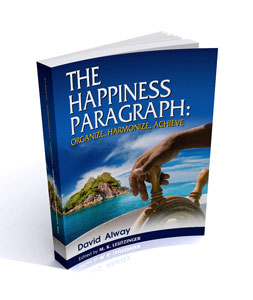The Happiness Paragraph - book outline
Here is The Happiness Paragraph Outline - which serves as a quick summary of the book contents:
(1) What is happiness?
- Happiness is a person's degree of satisfaction with his entire life
- Events closer in time have a greater influence on your happiness.
- Happiness can only be measured in a relative manner, by comparing degrees of happiness at different times and in relation to different events.
- Happiness is in part maximized by avoiding major goal conflicts and by pursuing goal harmony when possible.
- Happiness can fade and so it requires new experiences/goal achievements in order to be maximized.
(2) The Happiness Paragraph
That man (or woman) is happiest who chooses a major purpose based on his own thoughts about the world, his abilities, and his desires - a purpose that he reasons will be enjoyable to pursue, that will stretch his abilities and effort in order to achieve it, and that will be meaningful to him once it is achieved. Lesser goals will also be pursued in order to actualize his potential in other realms. He will reward himself along the way by celebrating major and minor achievements and by enjoying immediate pleasures including friendships and romance. He will correct his course and goals based on any new information he discovers along the way. Whether he achieves his goal or is defeated, after a period of celebration or sadness, respectively, he will start this process again and carefully set a new goal or goals. Certain virtues will aid him in his progress and help him to avoid pitfalls in the long term.
(3) Identifying and Achieving a Major Purpose
- Personal achievement is the key to happiness
- Having a major goal helps give you clarity, reduces conflicts among goals, and allows for higher levels of achievement.
- Pursuing your major goal should be both enjoyable and meaningful to you.
- Establish your major goal looking for that 'just right' level of challenge.
- As your ability increases, seek higher and higher levels of control over the work you do.
- Younger people should strongly consider a long-term (career-oriented) approach but the timescale for major goal completion is person/situation specific.
(4) Other Goals
- It is desirable to actualize goals in other aspects of your life to be more fulfilled.
- Hobbies and relationships can be part of these other goals and may take on significant important in your life.
- Life's basic requirements must be met (health, sustenance, finances)
- Money helps you to enjoy your life by giving you greater security, more time to do the things you enjoy, and more options to enjoy. It may also allow you to widen the scope of your business or other activities.
(5) Rewards and Celebrations
- Immediate pleasures are an essential day-to-day form of experiencing happiness.
- Immediate pleasures must feel earned to truly enjoy them
- The right balance between work and play should be individualized
- Friendships and romantic relationships based on mutual values can contribute immensely to a person's happiness.
- You cannot easily control whom you will meet in life or the coarse of close personal relationships.
(6) Self-Review and Correction
- The world is not entirely predictable and plans may need to be modified or completely changed based on new information
- Some very successful businesses and individuals have had to modify their plans significantly.
(7) Repeat The Process
- For the best happiness results, you must continue to repeat the outlined process.
(8) Virtues: High Level Happiness Concepts
- Various virtues (Moral Ambition, Rationality, Independence, Honesty, Justice, Integrity, Productiveness) can help you achieve happiness in the long term.
(9) Getting Started
- A discussion of how to start using the book.
